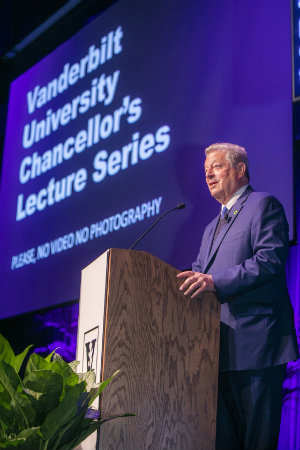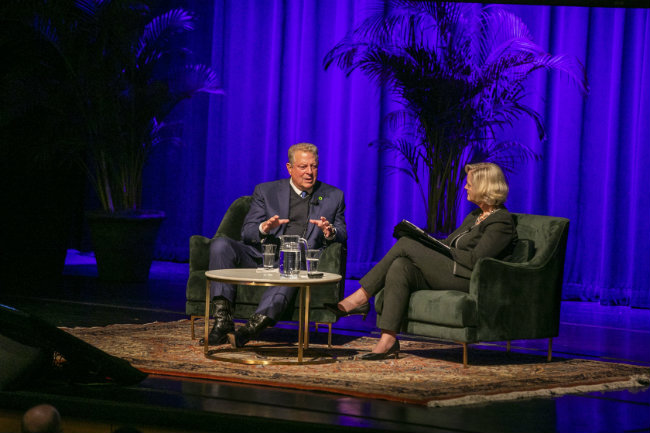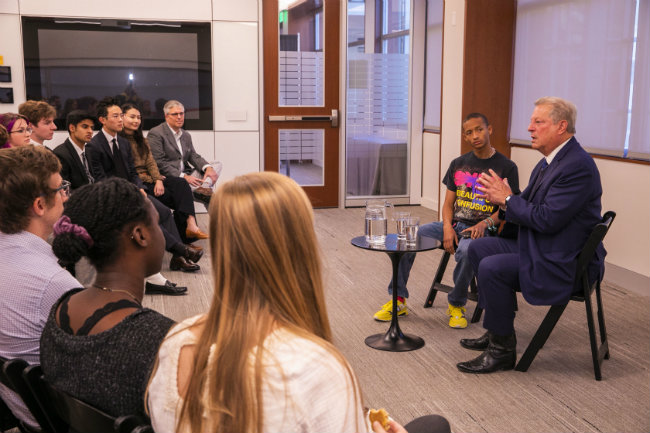During former Vice President Al Gore's presentation at Vanderbilt University on the global climate crisis and solutions, the Nobel Peace Prize laureate said he remains optimistic about policy change-given not only the economics of renewable energy but also the determination he has observed in "the voices, the hearts and the eyes" of today's young people.
The Nov. 20 presentation-part of a worldwide event called "24 Hours of Reality: Truth in Action," led by Gore and The Climate Reality Project, which he founded and chairs-was in partnership with the Vanderbilt Chancellor's Lecture Series. Gore said the event at Langford Auditorium was the flagship presentation of approximately 1,700 events around the world and all 50 U.S. states over a 24-hour period.
Interim Chancellor and Provost Susan R. Wente introduced Gore to the students, faculty, staff and community members in the packed Langford Auditorium and shared the university's commitments to environmental stewardship.
"As a university, we have committed to becoming carbon neutral and powering our campus entirely through renewable energy by the year 2020," Wente said. "We are putting our research into action, as our experts in policy, engineering, the environment, infrastructure and other key areas work on solutions to advance sustainability efforts at Vanderbilt and around the world. And those efforts align with tonight's conversation."

Prior to beginning his 60-minute slide show, Gore asked a surprise guest-singer-songwriter and actor Jaden Smith-to come on stage. Gore described Smith as a young-generation leader and activist in the climate movement. Smith said that An Inconvenient Truth, Gore's 2007 Oscar-winning documentary, made a transformational impact on his views on climate crisis.
Gore addressed three main questions regarding the earth's climate in his presentation: must we change, can we change and will we change?
He began with a warning that some of the images and information might be overwhelming. "This can be hard to listen to but we have to understand the magnitude of this historic challenge," Gore said. "And the answers to the second and third questions are truly optimistic and uplifting."
Gore noted there's an 85 percent chance of 2019 being the second hottest year on record according to a leading expert at NASA. The five hottest years on record have all been in the last five years. He also talked extensively about the impact of the climate on natural disasters that include massive floods and devastating fires around the globe.
Gore showed slides from the 2010 flood in Middle Tennessee, including a house floating down I-24 from south Nashville to Murfreesboro. "Thousands of my neighbors lost their homes and businesses and they didn't have flood insurance because it had never flooded in those areas," Gore said. "You see events like this happening four times more frequently now than in 1980 all over the world." One of the negative impacts of increased flooding is the international spread of mosquito-borne diseases, such as dengue fever.
Gore also cited several examples of recent fires caused by extremely hot and dry conditions, including one that resulted in $500,000 in damage to the Reagan Presidential Library in northern California. "The three largest fires in the world that we know about have happened in the last two years in California," he said.
Gore's presentation also focused on many solutions to the climate crisis that are being driven by new technology and market trends. For example, Gore attended the New Jersey governor's announcement this week that the state will produce 7,500 megawatts of electricity through wind energy by 2035.

Solar technology is another industry growing by leaps and bounds, Gore said. The fastest-growing job in the United States for the last five years has been that of solar installer.
Gore received a standing ovation at the conclusion of his presentation, which was followed by Q&A with Wente. She led off the questions by asking what he saw as the biggest challenges and opportunities that our climate will pose over the next five years.
Encouraging the audience to be engaged with policymakers, Gore emphasized that the climate crisis is not a partisan issue. He also thanked the Vanderbilt College Republicans for being among those college chapters that have petitioned the National Republican Committee to change its position on climate change.
In conclusion, he urged the audience to register to vote. "Join those who are using their voices and votes to fight the climate crisis. For one thing, your world does depend on it. This is the life or death struggle of this generation."

Earlier in the afternoon, Gore and Smith met with students studying earth and environmental science, as well as students active in climate advocacy.
Gore has longtime connections to Vanderbilt University. His mother, Pauline, graduated from Vanderbilt Law School in 1936, and was among the first women to do so. The former vice president attended Vanderbilt Law School and the Graduate School's Department of Religious Studies.
The Chancellor's Lecture Series






